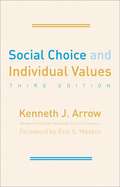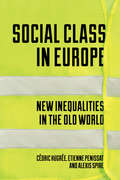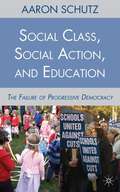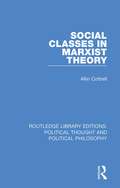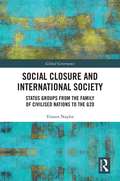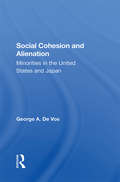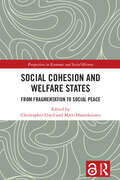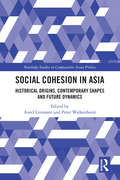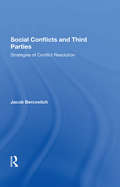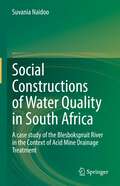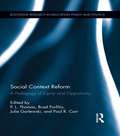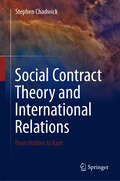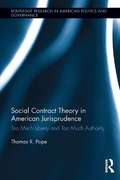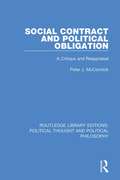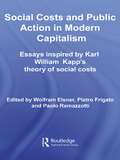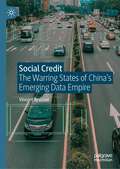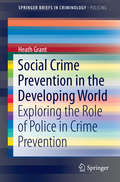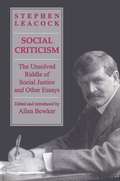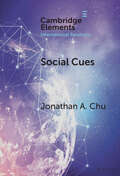- Table View
- List View
Social Choice and Individual Values
by Kenneth J. Arrow Eric S. MaskinOriginally published in 1951,Social Choice and Individual Valuesintroduced “Arrow’s Impossibility Theorem” and founded the field of social choice theory in economics and political science. This new edition, including a new foreword by Nobel laureate Eric Maskin, reintroduces Arrow’s seminal book to a new generation of students and researchers. "Far beyond a classic, this small book unleashed the ongoing explosion of interest in social choice and voting theory. A half-century later, the book remains full of profound insight: its central message, ‘Arrow’s Theorem,’ has changed the way we think. ”—Donald G. Saari, author ofDecisions and Elections: Explaining the Unexpected
Social Choice and Legitimacy
by John W. Patty Elizabeth Maggie PennGoverning requires choices, and hence trade-offs between conflicting goals or criteria. This book asserts that legitimate governance requires explanations for such trade-offs and then demonstrates that such explanations can always be found, though not for every possible choice. In so doing, John W. Patty and Elizabeth Maggie Penn use the tools of social choice theory to provide a new and discriminating theory of legitimacy. In contrast with both earlier critics and defenders of social choice theory, Patty and Penn argue that the classic impossibility theorems of Arrow, Gibbard, and Satterthwaite are inescapably relevant to, and indeed justify, democratic institutions. Specifically, these institutions exist to do more than simply make policy - through their procedures and proceedings, these institutions make sense of the trade-offs required when controversial policy decisions must be made.
Social Citizenship and Workfare in the United States and Western Europe
by Joel F. HandlerThis book compares workfare policies in the United States and 'active labor policies' in Western Europe that are aimed primarily at the long-term unemployed, unemployed youth, lone parents, immigrants and other vulnerable groups often referred to collectively as the 'socially excluded'. The Europeans maintain that workfare is the best method of bringing the socially excluded back into mainstream society. Although there are differences in terms of ideology and practice, Joel F. Handler argues that there are also significant similarities, especially field-level practices that serve to exclude those who are the least employable or lack other qualifications that agencies favor. The author also examines strategies for reform, including protective labor legislation, the Open Method of Coordination, the reform of social and employment services, and concludes with an argument for a basic income guarantee, which would not only alleviate poverty but also provide clients with an exit option.
Social Class and Educational Inequality: The Impact of Parents and Schools
by Iram Siraj Aziza MayoSocial class is often seen as an intractable barrier to success, yet a number of children from disadvantaged backgrounds still manage to show resilience and succeed against the odds. This book presents the findings from fifty Child and Family Case Studies (CFCS) conducted with 13–16 year olds. The authors look specifically at the roles that people and experiences - at home, in schools and in the wider community - have played in the learning life-courses of these children; how these factors have affected their achievement; and explanations and meanings given by respondents to the unique characteristics, experiences and events in their lives. Featuring the voices of real parents and children, and backed up by a decade of quantitative data, this is a compelling record that will help readers to understand the complex nature of social disadvantage and the interplay between risk and protective factors in homes and schools that can make for a transformational educational experience.
Social Class in Europe: New Inequalities in the Old World
by Etienne Penissat Alexis Spire Cedric HugreeMapping the class divisions that run throughout EuropeOver the last ten years - especially with the 'no' votes in the French and Dutch referendums in 2010, and the victory for Brexit in 2016 - the issue of Europe has been placed at the centre of major political conflicts. Each of these crises has revealed profound splits in society, which are represented in terms of an opposition between those countries on the losing and those on the winning sides of globalisation. Inequalities beyond those between nations are critically absent from the debate. Based on major European statistical surveys, the new research in this work presents a map of social classes inspired by Pierre Bourdieu's sociology. It reveals the common features of the working class, the intermediate class and the privileged class in Europe. National features combine with social inequalities, through an account of the social distance between specific groups in nations in the North and in the countries of the South and East of Europe. The book ends with a reflection on the conditions that would be required for the emergence of a Europe-wide social movement.
Social Class, Social Action, and Education
by Aaron SchutzSchutz demonstrates that progressive ideas of democracy emerged out of the practices of a new middle class, reacting, in part, against the more conflictive social struggles of the working-class. The volume traces two distinct branches of democratic progressivism: collaborative and personalist.
Social Classes in Marxist Theory (Routledge Library Editions: Political Thought and Political Philosophy #17)
by Allin CottrellFirst published in 1984. This study critically examines the conceptions of social class employed by Marx and by modern Marxist writers, to probe their problematic areas and to propose certain modifications to those conception. The author also tests the conclusions deriving from this theoretical reflection against the task of analysing some aspects of the development of class relations in a particular social formation in Britain. This title will be of interest to students of philosophy and politics.
Social Closure and International Society: Status Groups from the Family of Civilised Nations to the G20 (Global Governance)
by Tristen NaylorLaying the foundations of a theory of ‘international social closure’ this book examines how actors compete for a seat at the table in the management of international society and how that competition stratifies the international domain. In a broad historical survey from the ‘Family of Civilised Nations’, through the Great Powers’ club, to the G7 and G20 today, Naylor investigates the politics of membership in the exclusive clubs that manage international society and ensure its survival, providing us with a new way to think about how status competition has changed over time and what this means for international politics today. With its sociologically grounded theory, this book advances English School scholarship and transforms the study of contemporary summitry, providing a ground-breaking approach rooted in archival research, elite interviews, and ethnographic participant observation. This book is of interest to international relations scholars interested in the ‘expansion’ and globalisation of international society, the history of international summits, and transformations in international order, as well as to those examining concepts including stratification, hierarchy, and networked governance. With its emphasis on non-state actors in global governance, scholars and practitioners alike working on/for civil society will also find this research of great value.
Social Cohesion And Alienation: Minorities In The United States And Japan
by George De VosAn attempt at a final summary of much of my work in anthropology has been divided into two separate volumes, Status Inequality: The Self in Culture, 1990, published by Sage Publications and this present volume, Social Cohesion and Alienation: Minorities in the United States and Japan. Many of the themes touched upon in both volumes have appeared in a series of writings that stretch through a period starting in the early sixties through the late eighties. Some of these efforts resulted in books; others appeared separately as invited contributions to symposia, as special issues of journals, or as parts of edited volumes.
Social Cohesion and Welfare States: From Fragmentation to Social Peace (Perspectives in Economic and Social History)
by Christopher Lloyd Matti HannikainenAiming to go beyond reiterating the stereotypical narrative of the rise of welfare states, this interdisciplinary book examines the long-run historical processes of the development of the welfare state. It focuses on the complex political, social, economic and institutional transformations which give rise to these peaceful and cohesive societies. Welfare is crucial to the story of peaceful social integration and this book explores and explains this vital connection, taking a non-linear view of the history of moving from fragmentation to peace with comprehensive welfare institutions. Chapters collectively focus on three central areas: (a) types of socio-political fragmentation, (b) the interconnection of social, political, and economic forces that led to the institutionalisation of integrationist processes and policies (including re-distributional welfare systems), and (c) how this new institutional development helped achieve, or failed to achieve, social peace and welfare. The international panel of expert contributors provide case studies from a rich variety of country contexts, including Germany, South Africa, the Netherlands, Austria, and the Nordic Countries. This thought-provoking collection of essays is well suited for advanced students and researchers in social history, economic history, political economy and social policy.
Social Cohesion in Asia: Historical Origins, Contemporary Shapes and Future Dynamics (Routledge Studies on Comparative Asian Politics)
by Peter Walkenhorst Aurel CroissantThis book explores the historical origins, contemporary dynamics and future challenges of social cohesion in South, Southeast and East Asia—one of the most dynamic and at the same time heterogeneous regions in the world, in terms of economic, political and human development. The comparative case studies in this volume develop a better understanding of social cohesion in Asia by exploring how social cohesion is understood, analyzed and sometimes politically instrumentalised. Examining different dimensions and qualities of social cohesion and how they are linked together, it also discusses the challenges of social cohesion in individual societies. The case studies include examples from Bangladesh, India, Sri Lanka, Indonesia, Myanmar, Singapore, South Korea and Mainland China and building on the conceptual work and empirical findings of the Asian Social Cohesion Radar, this book provides detailed cross-country analyses over the past 15 years. Combining rigorous conceptual and theoretical reasoning with a systematic empirical analysis of trends across the region, Social Cohesion in Asia will be of great interest to students and scholars of Asian politics, international relations, political sociology, comparative politics and Democratization Studies.
Social Conflicts And Third Parties: Strategies Of Conflict Resolution
by Jacob BercovitchThe pressing need to find new ways to settle social disputes and render them less destructive has led to a concern with the role that outsiders–or third parties–can play in the conflict resolution process. This book contributes to an increased understanding of the nature and activities of third parties in a wide range of conflict situations. Dr. Bercovitch first describes and interprets the major elements of the third-party intervention process, then provides an empirical examination of its structure and characteristics in settings as diverse as family struggles, labor-management problems, and international disputes. Throughout, he illustrates the dynamics of the process from the vantage point of the third parties themselves. Finally he points out the conditions most likely to strengthen this type of conflict management and discusses the means for determining the appropriate forms of intervention at different junctures of a dispute.
Social Conservatives and Party Politics in Canada and the United States
by James FarneyThe strength of the Tea Party and Religious Right in the United States, alongside the Harper Conservatives' stance on same-sex marriage and religious freedom in Canada, has many asking whether social conservatism has come to define the right wing of North American politics.In this timely and penetrating book, James Farney provides the first full-length comparison of social conservatism in Canada and the United States from the sexual revolution to the present day. Based on archival research and extensive interviews, it traces the historic relationship between social conservatives and other right-wing groups. Farney illuminates why the American Republican Party was quicker to accept social conservatives as legitimate and valuable allies than the Conservative Party of Canada.This book will be indispensable for understanding why a movement so powerful amongst American conservatives has been distinctively less important in Canada and how the character of Canadian conservatism means it will likely remain so.
Social Constructions of Water Quality in South Africa: A case study of the Blesbokspruit River in the Context of Acid Mine Drainage Treatment
by Suvania NaidooThis book details how the water quality of the Blesbokspruit River in Gauteng, South Africa was socially constructed by stakeholders and key individuals in the context of acid mine drainage (AMD) and its treatment. Social constructionism is used as the framing for this research to explain how water is intrinsically social. Findings presented here show that stakeholders are aware that the changes in the physicality of the Blesbokspruit resulted from human interventions and varied uses of the water over the years. Such knowledge, among factors such as the historical context of mining, current coal mining, flows and volumes of water, technology used and processes followed, information and communication, and vested interests influence social constructions of the water quality. What counts as the truth about water varies depending on the individual’s perspective, their purpose, and their individual interests. Further, how one defines water quality influences what treatment processes are preferred in order to improve water quality. The book explains why, for example, a treatment process meant to improve water quality gained a bad reputation by the public because of the South African government’s silo approach. The book explains how these social constructions are entrenched in power relations between stakeholders regarding AMD treatment and illustrates how power was used to influence decisions to improve the water quality of the Blesbokspruit. The case presented in this book offers insights and recommendations for policymakers working in water governance, including means to influence social constructions of water quality and ways to clarify roles and responsibilities in pursuit of improved cooperative government.
Social Context Reform: A Pedagogy of Equity and Opportunity (Routledge Research in Education Policy and Politics #5)
by Julie Gorlewski P. L. Thomas Brad Porfilio Paul R. CarrCurrently, both the status quo of public education and the "No Excuses" Reform policies are identical. The reform offers a popular and compelling narrative based on the meritocracy and rugged individualism myths that are supposed to define American idealism. This volume will refute this ideology by proposing Social Context Reform, a term coined by Paul Thomas which argues for educational change within a larger plan to reform social inequity—such as access to health care, food, higher employment, better wages and job security. Since the accountability era in the early 1980s, policy, public discourse, media coverage, and scholarly works have focused primarily on reforming schools themselves. Here, the evidence that school-only reform does not work is combined with a bold argument to expand the discourse and policy surrounding education reform to include how social, school, and classroom reform must work in unison to achieve goals of democracy, equity, and opportunity both in and through public education. This volume will include a wide variety of essays from leading critical scholars addressing the complex elements of social context reform, all of which address the need to re-conceptualize accountability and to seek equity and opportunity in social and education reform.
Social Contexts of Radicalization and Violent Extremism in the MENA and Balkans: A Multi-Country Analysis
by Corinne Torrekens Tasnim Chirchi Lurdes Vidal BertranThis volume is a multilevel and multidisciplinary study of radicalization in the Balkans and MENA regions. It takes a dynamic approach embracing the complexity of the social, political and economic contexts under study. Moving away from unidimensional and security-centred research on the topic, each chapter adopts a participatory and inclusive perspective, engaging communities, youth and women as significant stakeholders in building a better understanding of the dynamics of the radicalization of youth in these regions. The multiple case studies presented here cover several macro drivers of radicalization to reveal the interactions and interrelations of individuals with meso-institutions and backgrounds such as family, neighbourhood, school, peer groups, religious and ethnic communities, political parties, etc. Consequently, the volume addresses several gaps in the literature regarding radicalization and violent extremism: it is based on firm empirical evidence; it allows for comparisons between social contexts in one specific country and between countries sharing macro similarities but also differences; it proposes a fruitful dialogue and collaborations between academics, researchers and civil society experts; and, finally, it offers decentralized perspectives on extremism in the West. This volume is an important addition to a topic that is of interest to researchers across the social sciences, and to think tanks and policy makers working on/in these regions.
Social Contract Theory and International Relations: From Hobbes to Kant
by Stephen ChadwickThis book provides a systematic analysis of Hobbes, Locke, Rousseau and Kant with respect to international relations. These philosophers belong to the social contract tradition and are considered some of the most influential political theorists. Their ideas have played a role in the formation of national political constitutions and remain very influential both in understanding and legitimising the structure of societies around the world. This book is an innovative analysis of what these thinkers have claimed regarding the relationship between nation states, rather than contributing to the established scholarship on what they have said about individual political societies. Specifically, individual chapters examine war and peace, world governance, inequality, and terrorism.
Social Contract Theory in American Jurisprudence: Too Much Liberty and Too Much Authority (Routledge Research in American Politics and Governance)
by Thomas R. PopeDespite decades of attempts and the best intentions of its members, the United States Supreme Court has failed to develop a coherent jurisprudence regarding the state’s proper relationship to the individual. Without some objective standard upon which to ground jurisprudence, decisions have moved along a spectrum between freedom and authority and back again, affecting issues as diverse as individual contractual liberties and the right to privacy. Social Contract Theory in American Jurisprudence seeks to reintroduce the lessons of modern political philosophy to offer a solution for this variable application of legal principle and to lay the groundwork for a jurisprudence consistent in both theory and practice. Thomas R. Pope’s argument examines two exemplary court cases, Lochner v. New York and West Coast Hotel v. Parrish, and demonstrates how the results of these cases failed to achieve the necessary balance of liberty and the public good because they considered the matter in terms of a dichotomy. Pope explores our constitution’s roots in social contract theory, looking particularly to the ideas of Thomas Hobbes for a jurisprudence that is consistent with the language and tradition of the Constitution, and that is also more effectually viable than existing alternatives. Pope concludes with an examination of recent cases before the Court, grounding his observations firmly within the developments of ongoing negotiation of jurisprudence. Addressing the current debate between individual liberty and government responsibility within the context of contemporary jurisprudence, Pope considers the implications of a Hobbesian founding for modern policy. This book will be particularly relevant to scholars of Constitutional Law, the American Founding, and Modern Political Theory.
Social Contract and Political Obligation: A Critique and Reappraisal (Routledge Library Editions: Political Thought and Political Philosophy #38)
by Peter J. McCormickFirst published in 1987. This study is concerned with the problem of political obligation, the normative question of why one should obey the law, and with social contract thought as an answer to this question. It is entitled a critique, but the critique is not of social contract theory as such, but rather of the "orthodox" treatment of contract that yields so readily to the rough handling and easy rejection that is the normal lot of contractarianism in contemporary treatments. In its place will be suggested a reinterpretation of contract that sees it as making different assumptions and requiring different premises, and that is proof against many of the orthodox refutations of social contract theory; the reinterpretation is thus in the nature of a vindication. First, from an examination of the most commonly cited champions of contractarianism (namely Hobbes, Locke and Rousseau) will be derive a reinterpretation of contract in the form of a new model or syllogism, the features of which will be brought out by contrasting it first with the contemporary ideas of John Rawls and then with the orthodox model itself. Democratic consent theory, as the heir to the remnants of the orthodox model, will be examined, and the ideas of T. H. Green will be considered as embodying an important feature of contractarianism omitted or ignored by the orthodox model (and hence by democratic theory.) Finally, the new model of contract will be suggested as a potentially useful approach to the problem of political obligation in the modern context. This title will be of interest to student of politics and philosophy.
Social Control and Deviance: A South Asian Community in Scotland
by Ali WardakThis title was first published in 2000: This book provides an empirical account of social control and deviance in a South Asian community in Scotland. Focusing on Edinburgh’s Pakistani community, the book examines the social order of this particular community and the ways it is maintained. It explores the various social institutions and processes that operate as mechanisms of (informal) social control within the community. This book also examines the ways the second generation South Asians relate to their community and the extent to which they conform, or deviate from its norms. Criminological social control theory is used as an analytical framework for explaining deviance. It is concluded that the South Asian youngsters (boys) who have weak / broken bonds with their community are more likely to deviate from its norms. The book further concludes that social control and deviance are intricately interrelated. While social control defines what is deviance, the latter has important implications for the former: repeated occurrence of deviance prompts agencies of social control to redefine and gradually normalize deviance.
Social Costs and Public Action in Modern Capitalism: Essays Inspired by Karl William Kapp's Theory of Social Costs (Routledge Frontiers of Political Economy)
by Wolfram Elsner Pietro Frigato Paolo RamazzottiThe Social Costs approach to the globalised capitalist market economy has gained new relevance in recent years. The present situation is one of widespread and increasing deterioration of the social, cultural, democratic, and environmental frameworks of advanced capitalist market societies. This deterioration is indicated by the threats of unemployment, precarious working conditions and increasing income/status inequality, uneven geographical developments, and the exploitation and undermining of the institutional fabric of the society. It is aggravated by the rapid extension - at local, national, regional and global scales - of ecological disruption. So the global capitalist market economy is characterised by a great deal of instability and so-called true uncertainty, which largely undermine its coordinating and welfare-enhancing capacity. The view suggested by Karl William Kapp’s seminal evolutionary open-systems approach is that these processes and problems are the outcome of a widening gap between private individualist economic, and societal values or, to use Karl Polanyi’s terms, of the ever increasing disembeddedness of the economy from society and of the subjugation of society to the economy. The key actor in this process is business or, more specifically, it is the increasingly dominant, globalised, deregulated and disembedded hierarchical and power system of business enterprise. Current analyses of the global capitalist market economy are overdue to be undertaken making use of the powerful analytic frame of Karl William Kapp’s open systems economics. ‘Social Costs and Public Action in Modern Capitalism’ examines this approach from a theoretical, conceptual, empirical, policy and case study level.
Social Credit: The Warring States of China’s Emerging Data Empire
by Vincent BrusseeChina’s Social Credit System has fundamentally re-shaped of surveillance worldwide, with discussions of it making it into hundreds of media headlines and all the way into European Union legislation and the United Nations. Social Credit offers one of the first comprehensive assessments of this infamous system. It is aimed at the many experts and professionals – both scholarly and more broadly – that have to deal with its fallout on a regular basis. In a concise format, it covers the questions that have garnered the most attention worldwide: from social credit scoring and blacklists to its history and theoretical foundation. Throughout, its core thesis is that more often than not, even China’s government is at a loss what to do with this messy and complex initiative. This has caused fragmented and low-tech implementation, but where insufficient legal safeguards can have far-reaching implications for the normal market order and for human rights.
Social Crime Prevention in the Developing World
by Heath GrantThis Brief explores the role of social crime prevention as a crime reduction strategy in the developing world. "Social crime prevention" focuses on the social and economic factors that may contribute to violence and criminal behavior in a community. Particularly in the developing world, an understanding of the socioeconomic and political context holds long-term potential for crime reduction (rather than crime displacement); however, the strategies are complex and the results may be slow. Generally, police and law enforcement are relied upon to present quick results, where social crime prevention strategies can be viewed as being "soft on crime" or too slow. This Brief discusses the tension between the traditional role of police and proactive social crime prevention strategies in an international context, through a variety of case studies. It also provides recommendations for balancing or reshaping this role. This work will be of interest to researchers and policy makers interested in crime prevention, particularly in the developing world, criminal theory, police studies and related disciplines such as demography, sociology and political science.
Social Criticism: The Unsolved Riddle of Social Justice and Other Essays (The Royal Society of Canada Special Publications)
by Stephen Leacock Alan BowkerStephen Leacock, long celebrated as Canada's foremost humorist and social satirist, has received little recognition for his considerable accomplishments as a serious thinker and social critic. In fact, Leacock was a professor of political economy, and more than half of his writings addressed the pressing issues of his day. This volume represents the neglected aspect of Leacock's career, gathering together his writings on a range of subjects, including imperialism, education and culture, religion and morality, feminism, prohibition, and social justice.The collection begins with 'Greater Canada: an appeal,' which dates from 1907, when Leacock was a popular lecturer advancing the cause of imperialism. Bowker points out that, for Leacock, imperialism was more a spiritual mission than a political agenda, representing the opportunity to unite Canadians, to inspire allegiance to a lofty tradition, and thereby to combat the threat of materialism, urbanism, fragmentation, and continentalism. These themes resurface in subsequent essays, culminating in The Unsolved Riddle of Social Justice, which was published in 1920. Carefully selected, and prefaced with an updated introduction to Leacock's life and work, these essays contribute to our understanding of Leacock and illuminate his role as a major figure in Canadian intellectual history.
Social Cues: How the Liberal Community Legitimizes Humanitarian War (Elements in International Relations)
by Jonathan Art ChuThis Element advances a theory of social cues to explain how international institutions legitimize foreign policy. It reframes legitimization as a type of identity politics. Institutions confer legitimacy by sending social cues that exert pressures to conform and alleviate social–relational concerns regarding norm abidance, group participation, and status and image. Applied to the domain of humanitarian wars, the argument implies that liberal democracies vis-à-vis NATO can influence citizens and policymakers within their community, the primary participants of these military operations. Case studies, news media, a survey of policymakers, and survey experiments conducted in multiple countries validate the social cue theory while refuting alternative arguments relating to legality, material burden sharing, Western regionalism, and rational information transmission. The Element provides an understanding of institutional legitimacy that challenges existing perspectives and contributes to debates about multilateralism, humanitarian intervention, and identity. This title is also available as Open Access on Cambridge Core.
